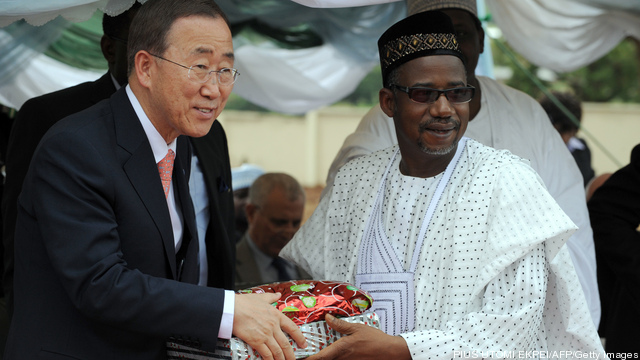Strong direction from G8 on climate, renewables, ending fossil subsidies is clear message for UN climate talks http://1.usa.gov/JZhZxL CFigueres
UN
Strong direction from G8 on climate, renewables, ending fossil subsidies is clear message for UN climate talks http://1.usa.gov/JZhZxL
By Peter GardettSign up and get Breaking Energy news in your inbox.
We will never sell or share your information without your consent. See our privacy policy.
 Country leaders gathered in Cartagena, Colombia for the Summit of the Americas.
Country leaders gathered in Cartagena, Colombia for the Summit of the Americas.
Latin America’s huge available renewable energy resource is appealing for both local and international project developers, but changes in both legislation and regulation are needed to catalyze markets in the region. Keep reading →
 The United Nations identified needed developments to eliminate the worst of world poverty in a program called the Millennium Development Goals. The key is to foster conditions for market-driven economic growth to create a safe infrastructure that includes the people most in need as empowered participants, not mere recipients of a handout. Success would eliminate current ineffectual foreign aid programs and uncoordinated charitable aid in favor of growth by-and for-the people.
The United Nations identified needed developments to eliminate the worst of world poverty in a program called the Millennium Development Goals. The key is to foster conditions for market-driven economic growth to create a safe infrastructure that includes the people most in need as empowered participants, not mere recipients of a handout. Success would eliminate current ineffectual foreign aid programs and uncoordinated charitable aid in favor of growth by-and for-the people.
In response, the IEEE (Institute of Electrical and Electronic Engineers) established a pilot program which identified Reliable Electricity as one of the key enablers of economic growth, especially in areas of the globe containing nearly 2 billion people subsisting on incomes of less than $2US per day. The correlation of poverty with lack of electricity is obvious, but solutions that truly effect sustaining economic change are not. Fortunately, we have learned that a small amount of electricity can have a huge benefit at an affordable cost. Moreover, the technology already exists to create a sustainable business model that, in principle, can grow rapidly to reach millions of people. Keep reading →

As a child growing up during the Korean War, I studied by candlelight. Electric conveniences such as refrigerators and fans were largely unknown. Yet within my lifetime, that reality changed utterly. Easy access to energy opened abundant new possibilities for my family and my nation.
Energy transforms lives, businesses and economies. And it transforms our planet – its climate, natural resources and ecosystems. There can be no development without energy. Today we have an opportunity to turn on the heat and lights for every household in the world, however poor, even as we turn down the global thermostat. The key is to provide sustainable energy for all. Keep reading →

Investors representing staggering sums of money gathered at the headquarters of United Nations to hear a day of discussions on climate risk and energy solutions this week.
The packed room included bankers, pension fund executives, policy-makers and the usual crowd of climate change professionals largely made up of consultants that cycle in and out of public and private organizations wearing different hats but often propounding the same message. Their message is one that seemed welcome in the last decade – that markets could be harnessed to solve climate change problems, that a price on carbon emissions would be good not just for health but for businesses currently facing (in the oft-quoted Nicholas Stern phrase) “a result of the greatest market failure the world has seen.” Keep reading →

Last week, news from the Department of Energy’s Carbon Dioxide Information Analysis Center announced that 2010 was a record year for CO2 emissions. Not only did emissions reach a record high, but the annual amount of growth was unprecedented.
This is a worrying rise. It means that emissions are exceeding the Intergovernmental Panel for Climate Change’s (IPCC‘s) worst-case scenario. It means that the world could be heading for dangerous, unprecedented, and irreversible climate change. Keep reading →

According to the United Nations Population Fund, the Earth’s seven billionth person was born today, a large milestone not only in number but in the effects it will have on our planet’s resources. If that person consumes water like an American, before leaving this earth, he or she will have used more than 4.3 million gallons of water, perhaps Earth’s most precious resource. Water has no alternatives; there is no substitute for its role in energy, agriculture and basic life necessities. It is as unique as it is indispensable.
As necessary as water is, this fuel remains taken for granted. While populations continue to expand and financial belts continue to tighten, political leaders and communities must become more engaged to find unique solutions for the continued reliability of water delivery. The coming decades will yield water crises in portions of the globe previously immune to such challenges. Government commitment has to be clear, like H2O itself. Keep reading →
